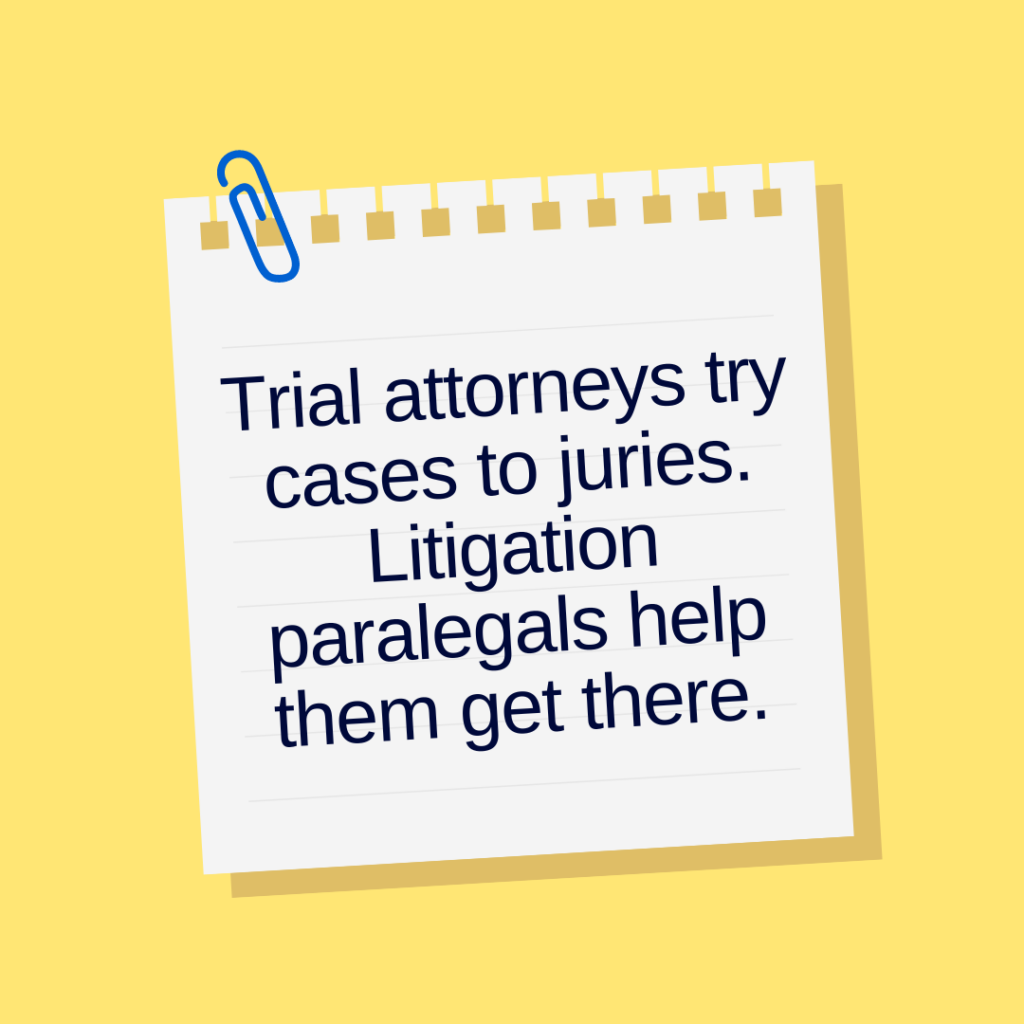Trial attorneys try cases to juries. Litigation paralegals help them get there. If you enjoy critical thinking and problem-solving, then civil litigation defense is where you want to be. It can be fast-paced, and the challenges presented can change from day to day, which definitely keeps things interesting.
Working the civil litigation defense case up for trial
Lawsuits typically follow the same procedure: filing of the Complaint, discovery, and trial. As a litigation paralegal, you will be vital in helping your supervising attorney(s) prepare for trial.
You’ll be tasked with, among other things, file management, gathering facts and information, conducting interviews, drafting and analyzing legal documents, and making recommendations to attorneys.
1. Complaint is filed. Let the games begin.
Once a Complaint has been filed, the first thing you will want to do as the defense is determine when your client was served. This is not to be confused with the date the Complaint is filed. The date the client is served is the date they actually receive the Complaint and are notified about the lawsuit.
Getting this date correct is vital as it starts the clock for when your Answer is due. The Answer is arguably the most important filing in the case. If you miss the deadline for filing your Answer, you may be SOL.
You’ll also need to determine what venue your case will be in. Each state may differ, but typically, in state matters, you have 30 days to file your Answer with the court. In Federal Court, it’s typically 21 days. You’ll want to review the Local Rules for whatever jurisdiction you’re in. I usually always save a copy to the file for future reference.
Most states now have statewide e-filing, so it’s likely easier to remember the requirements for those states. However, if you are in a state like Tennessee, where each county does things differently, then you will especially want to review any Local Rules at the onset of your case assignment to familiarize yourself with the practices and procedures for that county.
Once you have determined the deadline for filing your Answer, you’ll need to mark it up on your calendaring system and set reminders to be sure it doesn’t get missed.
I typically set my deadlines for the day before they are due, just to be safe. This is especially helpful for the Answer deadline as you DO NOT want to miss it.
2. Discovery = Evidence
Preparing for trial begins well in advance of receiving the Notice of Trial.
Discovery is the process wherein each party gathers information and evidence they will need to prove their respective theories of the case at trial. You will typically have written discovery by way of interrogatories, requests for production of documents, and requests for admissions.
Depositions of the parties, as well as fact and expert witnesses, will also be taken. You can also request relevant records from third parties by way of subpoenas or authorizations.
Get tips on preparing a deposition summary and some examples of the different types of deposition summaries.
In written discovery, each party will request information regarding the facts of the case as well as basic information to use for further investigation. In medical malpractice, for instance, you will typically want to request any doctors the plaintiff has seen over the past several years.
There could be relevant health information regarding possible pre-existing conditions pertaining to the injuries alleged in the instant case. Thus, your supervising attorney will want to obtain those relevant records to further evaluate the claims.
You can request records by way of subpoena duces tecum or a HIPAA-compliant authorization if one is executed and provided by the opposing party.

Once you’ve gathered information and evidence through written discovery, depositions will likely be requested and scheduled.
Party Depositions
The first depositions taken are usually the party depositions, the plaintiff(s) and defendant(s). Upon completion of the party depositions, any fact or expert depositions will be taken.
Fact Depositions
Fact depositions may be comprised of individuals who may have knowledge of the facts surrounding the case and the claims alleged therein. These individuals will likely have been identified in written discovery.
Expert Depositions
If there are any individuals identified as providing expert opinions, their depositions will also be taken. For example, in medical malpractice cases, each side will have their own experts to testify on things such as what may have caused the alleged injury or what the standard of care for a certain medical profession is.
Creating indexes for all materials obtained through discovery will be essential in preparing for trial. Having an easily referenceable index of evidence will be crucial for your attorney and you as you assist them.
You want to make it as easy for them (and yourself) to find the information they need when they need it. Fumbling around in their files at trial is not a good look in front of on-looking jurors.
Your attorneys will want to appear calm, cool, collected, and confident in their case, which they will be with your help.
Trial Prep Boot Camp
Getting ready for trial is stressful and rewarding at the same time.
What if your next trial didn’t involve 14-hour work days?
We’ll show you to be so prepared for your next trial that you will actually enjoy going to trial…even if you work for the Master of Procrastination!

3. Trial - Prepping for the Big Show
Trial is where the culmination of years of hard work finally comes to fruition. When preparing for trial, organization is key. At least a month before the trial is scheduled, you will want to review the file to make sure you have all the relevant evidence at your attorney’s disposal.
Deposition Transcripts
You’ll want to review deposition transcripts, expert files, and any records and/or indexes created to ensure you have all the relevant evidence that will be vital in proving your attorney’s theory of the case at trial.
In reviewing deposition transcripts, you will want to:
(1) ensure that you have all of them and
(2) make sure you have all of the exhibits for each deposition.
Exhibits Filed Late
At times, there may be late-filed exhibits, in which case, you’ll want to follow up with the opposing party to ensure you receive them. You’ll want to check with your supervising attorney before making any requests, however.
Expert Files
You’ll also want to review all of your expert files to ensure you have all relevant materials pertaining to them and their opinions. You’ll want to include any reports authored by them, curriculum vitae, fee schedules, and any articles they may have relied upon in forming their opinions. You will also want to create expert files for the opposing party as well that include the same information for each of their experts.
Updated Discovery Records
You will also want to review any relevant records that were obtained through discovery to ensure you’ve received all of them and to request any updated records, if needed. This is where the indexes you created will be very useful.
You will find that each attorney you work for will have their own style and way of doing things. They may prefer files to be electronic, hard copy, and/or both. No matter how they prefer it, keeping it organized and at the ready will be your task.
Get a free template for a Trial Notebook to get you started on your next trial notebook (aka trial binder).

Trial attorneys try cases to juries. Litigation paralegals help them get there.
It’s a great feeling when all the years of hard work come together at trial.
It’s even better when you know you played such a vital role in helping your client obtain a favorable verdict.

Meet the Author – Rachael Duke
Rachael is a Certified Paralegal specializing in medical malpractice defense with 15 years of legal experience. She graduated from Middle Tennessee State University with a bachelor’s degree in political science with a concentration in pre-law and a minor in paralegal studies. Aside from her professional career, Rachael is a wife and mother of three, including a 6-year-old girl, 2-year-old boy, and 17 year old step-son. In her free time (if she has any), she enjoys going to concerts, going out on the lake, and kayaking.


























